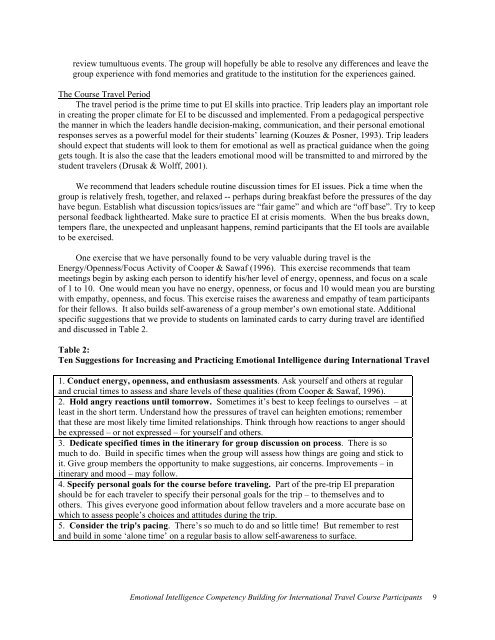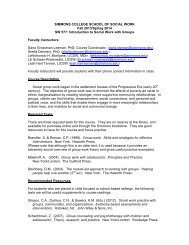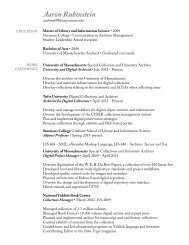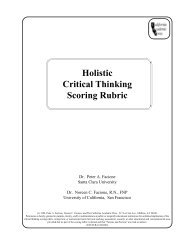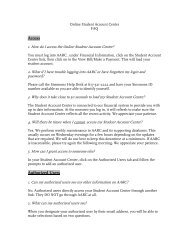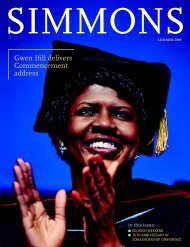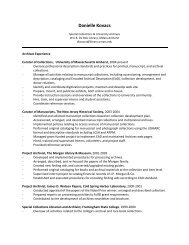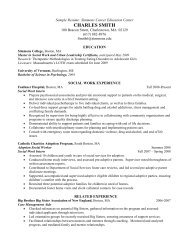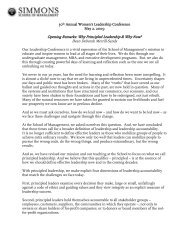Incorporating Emotional Intelligence into the Preparation and ...
Incorporating Emotional Intelligence into the Preparation and ...
Incorporating Emotional Intelligence into the Preparation and ...
Create successful ePaper yourself
Turn your PDF publications into a flip-book with our unique Google optimized e-Paper software.
eview tumultuous events. The group will hopefully be able to resolve any differences <strong>and</strong> leave <strong>the</strong>group experience with fond memories <strong>and</strong> gratitude to <strong>the</strong> institution for <strong>the</strong> experiences gained.The Course Travel PeriodThe travel period is <strong>the</strong> prime time to put EI skills <strong>into</strong> practice. Trip leaders play an important rolein creating <strong>the</strong> proper climate for EI to be discussed <strong>and</strong> implemented. From a pedagogical perspective<strong>the</strong> manner in which <strong>the</strong> leaders h<strong>and</strong>le decision-making, communication, <strong>and</strong> <strong>the</strong>ir personal emotionalresponses serves as a powerful model for <strong>the</strong>ir students’ learning (Kouzes & Posner, 1993). Trip leadersshould expect that students will look to <strong>the</strong>m for emotional as well as practical guidance when <strong>the</strong> goinggets tough. It is also <strong>the</strong> case that <strong>the</strong> leaders emotional mood will be transmitted to <strong>and</strong> mirrored by <strong>the</strong>student travelers (Drusak & Wolff, 2001).We recommend that leaders schedule routine discussion times for EI issues. Pick a time when <strong>the</strong>group is relatively fresh, toge<strong>the</strong>r, <strong>and</strong> relaxed -- perhaps during breakfast before <strong>the</strong> pressures of <strong>the</strong> dayhave begun. Establish what discussion topics/issues are “fair game” <strong>and</strong> which are “off base”. Try to keeppersonal feedback ligh<strong>the</strong>arted. Make sure to practice EI at crisis moments. When <strong>the</strong> bus breaks down,tempers flare, <strong>the</strong> unexpected <strong>and</strong> unpleasant happens, remind participants that <strong>the</strong> EI tools are availableto be exercised.One exercise that we have personally found to be very valuable during travel is <strong>the</strong>Energy/Openness/Focus Activity of Cooper & Sawaf (1996). This exercise recommends that teammeetings begin by asking each person to identify his/her level of energy, openness, <strong>and</strong> focus on a scaleof 1 to 10. One would mean you have no energy, openness, or focus <strong>and</strong> 10 would mean you are burstingwith empathy, openness, <strong>and</strong> focus. This exercise raises <strong>the</strong> awareness <strong>and</strong> empathy of team participantsfor <strong>the</strong>ir fellows. It also builds self-awareness of a group member’s own emotional state. Additionalspecific suggestions that we provide to students on laminated cards to carry during travel are identified<strong>and</strong> discussed in Table 2.Table 2:Ten Suggestions for Increasing <strong>and</strong> Practicing <strong>Emotional</strong> <strong>Intelligence</strong> during International Travel1. Conduct energy, openness, <strong>and</strong> enthusiasm assessments. Ask yourself <strong>and</strong> o<strong>the</strong>rs at regular<strong>and</strong> crucial times to assess <strong>and</strong> share levels of <strong>the</strong>se qualities (from Cooper & Sawaf, 1996).2. Hold angry reactions until tomorrow. Sometimes it’s best to keep feelings to ourselves – atleast in <strong>the</strong> short term. Underst<strong>and</strong> how <strong>the</strong> pressures of travel can heighten emotions; rememberthat <strong>the</strong>se are most likely time limited relationships. Think through how reactions to anger shouldbe expressed – or not expressed – for yourself <strong>and</strong> o<strong>the</strong>rs.3. Dedicate specified times in <strong>the</strong> itinerary for group discussion on process. There is somuch to do. Build in specific times when <strong>the</strong> group will assess how things are going <strong>and</strong> stick toit. Give group members <strong>the</strong> opportunity to make suggestions, air concerns. Improvements – initinerary <strong>and</strong> mood – may follow.4. Specify personal goals for <strong>the</strong> course before traveling. Part of <strong>the</strong> pre-trip EI preparationshould be for each traveler to specify <strong>the</strong>ir personal goals for <strong>the</strong> trip – to <strong>the</strong>mselves <strong>and</strong> too<strong>the</strong>rs. This gives everyone good information about fellow travelers <strong>and</strong> a more accurate base onwhich to assess people’s choices <strong>and</strong> attitudes during <strong>the</strong> trip.5. Consider <strong>the</strong> trip's pacing. There’s so much to do <strong>and</strong> so little time! But remember to rest<strong>and</strong> build in some ‘alone time’ on a regular basis to allow self-awareness to surface.<strong>Emotional</strong> <strong>Intelligence</strong> Competency Building for International Travel Course Participants 9


